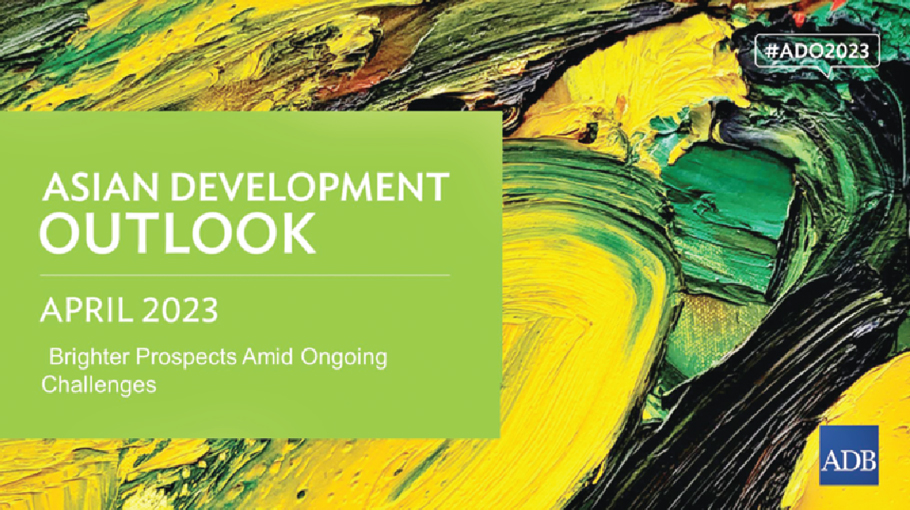‘Pvt consumption, investment, growth in industry expected to rise’
Asian Development Outlook, April 2023 report says

Private consumption, private investment and growth in industry are expected to rise in Bangladesh in the coming days while accelerating key reforms would help the country sustain higher growth, said Asian Development Bank (ADB) country director for Bangladesh Edimon Ginting.
"The contribution from private consumption is expected to be buoyed by higher remittances as more workers go abroad for jobs. Private investment is expected to rise as consumer and investor confidence improves," he said while speaking at the launching of the "Asian Development Outlook, April 2023: Brighter Prospects Amid Global Challenges" held at the resident mission office of the ADB in the capital today.
Senior country specialist of ADB Soon Chan Hong made a power-point presentation on the Outlook while head of external affairs of Bangladesh resident mission of ADB Gobinda Bar moderated the event.
The ADB country director said growth in industry is expected to accelerate with higher earnings from apparel and other exports in line with gradual improvement in global demand and continued government policy support.
The ADB said that Bangladesh's gross domestic product (GDP) is expected to grow by 5.3 percent in fiscal year FY23.
It said the slower growth forecast reflects subdued domestic demand and weaker export expansion due to slow global growth following the Russian invasion of Ukraine.
Inflation is forecast to accelerate from 6.2 percent in FY2022 to 8.7 percent in FY2023. The current account deficit is anticipated to narrow from 4.1 percent of GDP in FY2022 to 1.6 percent of GDP in FY2023 as imports loosen and remittances grow.
Answering to a question, Ginting said considering the current global condition, the projection of 5.3 percent growth for Bangladesh in FY23 is a 'very robust growth' as it is not a bad number, rather still a robust number for Bangladesh.
He said that the energy price adjustment in Bangladesh was a 'good reform' as it had slowed down the consumption side by side created fiscal space for cutting down expenditure.
The ADB county director noted that human resource development would be the key for future growth as Bangladesh aspires for becoming an upper mid-income country.
Noting that Bangladesh still needs a lot of investment to support the growth momentum, he said that the initiative for removing the cap in interest rates is good for the banking sector.
He said very flexible interest rate and exchange rate help modernize the monetary policy as well as more flexible exchange rate is very good to deal with the external imbalance.
"More flexible interest rate and exchange rate will help Bangladesh Bank to manage the monetary policy well," Ginting added.
Responding to another question on reforms, he said that reforms always have some short-term pains, but there is also long-term gains.
Due to price adjustment, he said the government would not have to spend more on subsidies in energy.
Citing that the dependence on imported energy is still a weakness, the ADB country director suggested for reducing the dependence on imported energy and striving more towards renewable energy and exploring other sources of energy and regional cooperation.
Replying to another question on how to stabilize the foreign currency reserve, he said that a major tool in this regard could be to make the exchange rate closer to the market and thus it would bring back dollars to the system.
Considering the smooth LDC graduation of Bangladesh, Ginting said that trade policy reforms need to be an important part of the government agenda while logistics is also a key.
In order to have successful diversification of exports, he suggested focusing more on agro-processed items, light machinery, high-end items like pharmaceuticals, and IT.
The main risk to this growth projection is a greater economic slowdown in Bangladesh's major export destinations driven by global uncertainty over the prolonged political tensions.
"The government is managing relatively well against the impact of external adversities and has embarked on the reform programs as precautionary measures," said the ADB Country Director.
"Accelerating key reforms during these difficult times would help the country sustain higher growth in the medium term. These reforms include strengthening public financial management and domestic resource mobilization, deepening the financial sector, and enhancing competitiveness to promote the creation of productive jobs in the private sector," Ginting added.
He said this is also a high time for enhancing resilience against the global energy market volatility by creating an enabling environment for rapid expansion of domestic renewable energy supply to reduce dependence on fossil fuels in line with the country's climate agenda.
The ADO April 2023 states that private investment growth will be lower because of energy shortages and higher production costs. With a shortfall in revenue collection, austerity measures, and depleting foreign exchange reserves, public investment growth will also be slower.
Inflation is expected to accelerate from 6.2 in FY2022 to 8.7 in FY2023 as price pressures increase due to the upward adjustment of domestic-administered prices for fuel oil, gas, and electricity, and higher global commodity prices.
In its 50-year partnership with Bangladesh, ADB has mobilized over $50 billion in loans and grants, including cofinancing, to improve infrastructure, public services, and social development for the country's people. ADB's current sovereign portfolio in Bangladesh has 50 projects worth about $11.9 billion.



